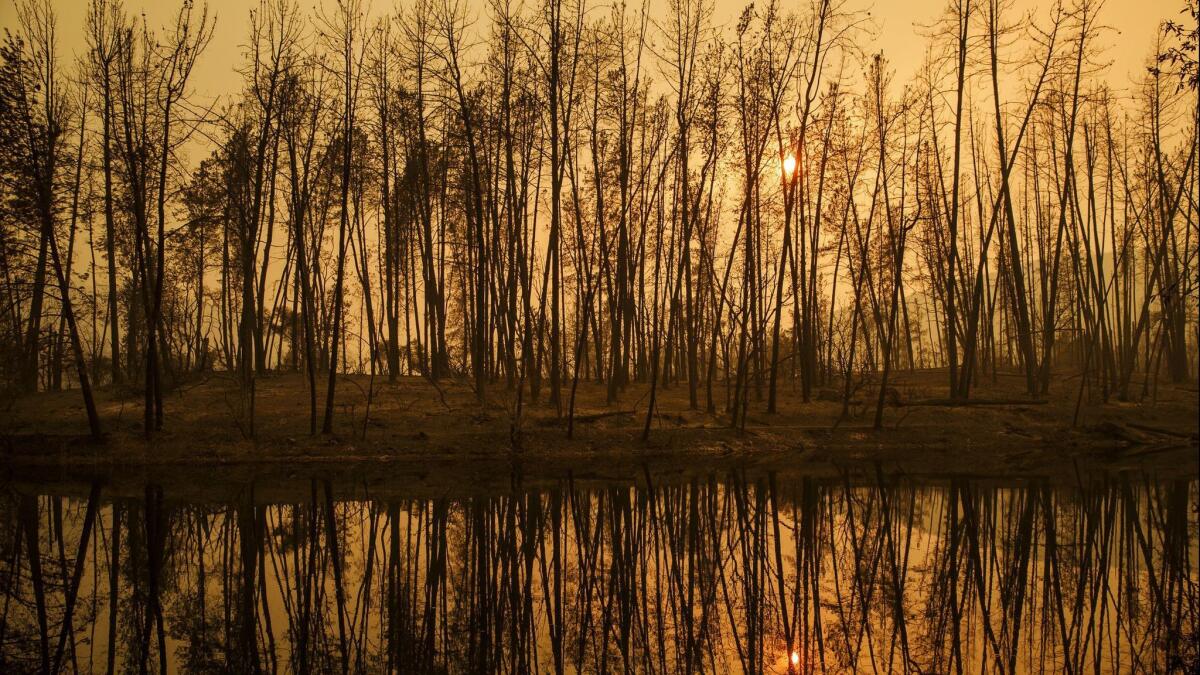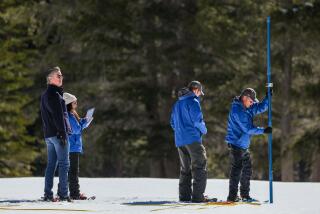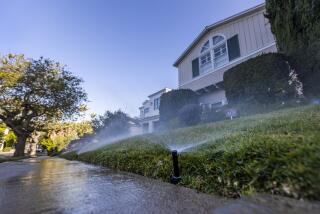Op-Ed: Dianne Feinstein: California needs to address its water and wildfire challenges now

As new leaders prepare to take office and shift to the business of governing, I hope we’ll focus on two vital issues for California: wildfires and water.
We are in the midst of the most destructive wildfire season in recorded California history. Nearly 2 million acres have burned, destroying more than 15,000 homes and killing more than 90 people.
We also just survived the worst drought in recent history. At its peak, almost 70 communities faced water supply and water quality problems, and more than 2,500 wells were critically low or dry.
We can’t wait for the world to roll back emissions to address our wildfire and water problems.
Science tells us that climate change is behind the intense drought and strong wildfires we’re now facing. These problems will only grow worse as temperatures continue to rise.
I’m proud that California is a leader, both nationally and globally, in cutting emissions. Along with 10 states and 280 American cities and counties, we remain committed to the Paris climate accord, even if President Trump is not.
But make no mistake: We can’t wait for the world to roll back emissions to address our wildfire and water problems. Preparing for these challenges will require an all-of-the-above approach, even if solutions aren’t popular.
We need to ensure our communities have an adequate supply of water, while also providing plenty of water for our environment and wildlife. To do this, we’ll need to store more water for the dry years, increase efficiency and find new water sources through desalinization, reclamation or recycling.
Our current water infrastructure was built mostly in the 1960s for a state of roughly 16 million people. California’s population is now more than 40 million, but our infrastructure remains largely the same. Modernizing this aging and inadequate water infrastructure will require cooperation between the public and private sectors at every level.
For these and other reasons, I’m working with Gov. Jerry Brown and House Majority Leader Kevin McCarthy on an extension of our California drought bill. This bipartisan bill has already helped us save more water from the wet years for the dry years, while also restoring habitat for salmon and other vulnerable fish populations. The bill needs to be extended because now is the time to start preparing for the next major drought.
We must also be ready to combat increasingly devastating wildfires. The latest National Climate Assessment found that, over the past three decades, the number of acres burned in the western United States is double what would have burned if the climate weren’t changing. Nowhere is this being felt more than in California.
There are 130 million dead trees in California’s forests, the result of both the historic drought and bark beetle populations that are growing as temperatures warm. A single spark in the middle of those dead trees can lead to an inferno.
We must move aggressively to remove these dead trees. But we must do it in a smart and sustainable way. I’ve joined California leaders and environmentalists in opposing the wholesale clearing of forests and fighting to keep important laws like the Endangered Species Act.
Cal Fire and the U.S. Forest Service agree that removing trees is necessary to combat blazes, and Congress provided the Forest Service with new tools and additional flexibility to do just that. My colleagues and I also secured seven C-130 air tankers for Cal Fire, giving California what will be the largest aerial firefighting fleet in the world. These planes will help Cal Fire aggressively contain wildfires before they burn out of control.
Enter the Fray: First takes on the news of the minute from L.A. Times Opinion »
But there’s still more that we can, and should, do to reduce the risks posed by wildfires. We can increase the use of firebreaks to stop massive wildfires from spreading into communities, spend more on advanced detection systems to identify outbreaks sooner, and invest in safer power transmission lines.
In the new year, I will sit down with Gov.-elect Newsom and his team, the secretaries of the Interior and Agriculture and anyone else who has novel ideas about how to prevent and limit the spread of wildfire. We will need to make hard choices.
Most importantly, we all need to accept the fact that climate change is happening now, and that it’s affecting our lives now. Global warming is creating new challenges every day. California must adapt to meet these new challenges. Lives depend on it.
Sen. Dianne Feinstein, a Democrat, is California’s senior U.S. senator and the ranking member of the Senate Judiciary Committee.
Follow the Opinion section on Twitter @latimesopinion or Facebook
More to Read
A cure for the common opinion
Get thought-provoking perspectives with our weekly newsletter.
You may occasionally receive promotional content from the Los Angeles Times.






